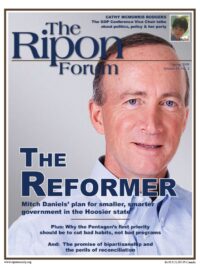 The nation, and in fact, the entire world are now well within the grip of a major economic downturn. The full duration and scope of this downturn are still undetermined, but it is unlikely that we have seen the bottom yet, and the United States government has taken unprecedented action to deal with this problem.
The nation, and in fact, the entire world are now well within the grip of a major economic downturn. The full duration and scope of this downturn are still undetermined, but it is unlikely that we have seen the bottom yet, and the United States government has taken unprecedented action to deal with this problem.
The first major action, taken in October 2008, created the Troubled Asset Relief Program (TARP) and was intended to prevent a complete collapse of our financial markets, which at the time was a very real possibility and would have led to literally thousands of bank failures. In my opinion, the TARP, in conjunction with the Federal Reserve’s monetary actions at the time, prevented this collapse, and accordingly I believe this scenario has now been avoided.
But still, major government actions and interventions continue, including the so-called “stimulus” spending bill, the nationalization of some banks and insurance companies (and arguably General Motors), more Fed actions, and additional programs being announced by Treasury or the Obama administration literally every day.
Why? If we’re no longer facing imminent collapse, what are these actions intended to accomplish? After all, you can’t prevent a recession that’s already happened, right?
No you can’t. But what government action is intended to do is make the recession shorter and shallower while limiting the negative long term impact. However much of the action taken thus far will neither make the recession shorter or shallower and has the potential to have very negative long term effects, such as high interest rates, inflation, and reduced growth.
But that is an argument for another column.
In this article, I would like to suggest an idea that will actually contribute to making this recession shorter and shallower. Furthermore, it will not cost the Federal Treasury or the Federal Reserve anything over the next 12 months. In fact, it will actually raise revenue without raising taxes in the short term. There will be little long term negative impact and no private businesses will be nationalized or drawn into receivership.
Sounds too good to be true? It’s not. Allow me to explain.
It is widely acknowledged that the depth of this recession has been amplified by fear, and indeed, panic. People are afraid to invest or spend for fear that they may lose their job, or that the price may yet go lower, or because they are concerned that the potential future risk is greater than any potential future return. If either the perceived risks in the marketplace were reduced or the potential returns were increased, then investors and the public at large might be more willing to invest and begin a return to a more normal environment.
To address this I have introduced legislation designed at improving this risk/return relationship in order to encourage people to invest now. H.R. 1632 would eliminate the Capital Gains tax on any assets purchased in 2009 (after the date of enactment of the bill) and held for at least 12 months. It will not matter when the asset is sold. For instance, if you buy a business in 2009 and sell it in 2015, you won’t pay a federal Capital Gains tax; if you buy a house in order to rent it out in 2009 and sell it in 2011, no capital gains tax. This bill will encourage the many people who are “sitting on the sidelines” to invest right now, rather than continue to wait for a “bottom” because they will be rewarded with a 15 percent greater return. This will encourage activity in the purchase of stocks, bonds, and real estate, which are major sectors of the economy that will need improvement before we can experience a recovery.
“…this capital gains tax holiday idea will stimulate economic activity and thereby create permanent private sector jobs and it will do so with no immediate cost whatsoever.”
As a bonus, this bill has no cost to the Federal Treasury for at least 12 months while the economy, and therefore revenues, are still struggling. In fact, the bill would certainly stimulate purchases of assets, which means that someone must sell those assets and may incur a capital gains tax on the sale that would not have otherwise occurred. Any loss of revenue would not occur until these assets are eventually sold, which cannot be before mid-2010, when hopefully, a recovery has taken hold. But even that revenue ‘loss’ is in question.
One thing we conservatives have always believed is that we should use ‘dynamic modeling’ when figuring the effect of tax policy. Therefore if you lower a tax, people will make different decisions due to the reduced tax. Those decisions may result in enough additional economic activity that revenue actually rises. Conversely, tax increases result in people making conscious decisions to avoid or reduce the increased tax thereby often resulting in reduced revenues.
But I digress. Suffice it to say, this capital gains tax holiday idea will stimulate economic activity and thereby create permanent private sector jobs and it will do so with no immediate cost whatsoever. This stands in contrast to many of the Obama/Pelosi policies which have huge costs and minimal job creation potential. In my opinion, these policies have largely made the problem worse rather than better.
There has been talk of a “Stimulus II” later this year. What might be included in that scares me if it’s anything like “Stimulus I.” But maybe — just maybe — we can include some cost-free common sense ideas like this one.
John Campbell represents the 48th District of California in the U.S. House of Representatives.




